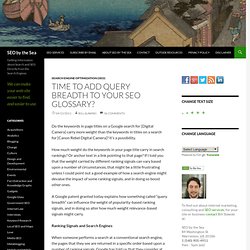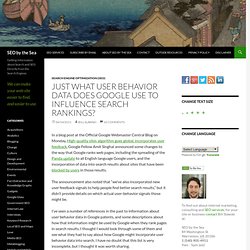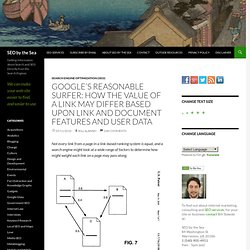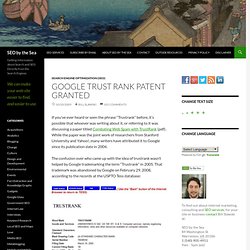

The bible :) Time to Add Query Breadth to Your SEO Glossary? Do the keywords in page titles on a Google search for [Digital Camera] carry more weight than the keywords in titles on a search for [Canon Rebel Digital Camera]?

It’s a possibility. How much weight do the keywords in your page title carry in search rankings? Or anchor text in a link pointing to that page? If I told you that the weight carried by different ranking signals can vary based upon a number of circumstances, that might be a little frustrating unless I could point out a good example of how a search engine might devalue the impact of some ranking signals, and in doing so boost other ones. A Google patent granted today explains how something called “query breadth” can influence the weight of popularity-based ranking signals, and in doing so alter how much weight relevance-based signals might carry.
Ranking Signals and Search Engines Other signals might be considered importance or popularity based signals, such as the quality and quality of links pointing to a page. Abstract. Just What User Behavior Data Does Google Use to Influence Search Rankings? In a blog post at the Official Google Webmaster Central Blog on Monday, High-quality sites algorithm goes global, incorporates user feedback, Google Fellow Amit Singhal announced some changes to the way that Google ranks web pages, including the spreading of the Panda update to all English language Google users, and the incorporation of data into search results about sites that have been blocked by users in those results.

The announcement also noted that “we’ve also incorporated new user feedback signals to help people find better search results,” but it didn’t provide details on which actual user-behavior signals those might be. I’ve seen a number of references in the past to information about user behavior data in Google patents, and some descriptions about how that information might be used by Google when they rank pages in search results. I thought I would look through some of them and see what they had to say about how Google might incorporate user behavior data into search. Google's Reasonable Surfer: How the Value of a Link May Differ Based upon Link and Document Features and User Data. Not every link from a page in a link-based ranking system is equal, and a search engine might look at a wide range of factors to determine how might weight each link on a page may pass along.

One of the signals used by Google to rank web pages looks at the links to and from those pages, to see which pages are linked to by others. Links from “important” pages carry more weight than links from less important pages. An important page under this system is one that is linked to by other important pages, or by a large number of less important pages, or a combination of the two. This signal is known as PageRank, and it is only one of a large number of Google ranking signals used to rank web pages and determine how highly those pages show up in search results in response to a query from a searcher. An early paper by the founders of Google, The Anatomy of a Large-Scale Hypertextual Web Search Engine, tells us: PageRank can be thought of as a model of user behavior.
The patent is: Abstract Conclusion. Google Trust Rank Patent Granted. If you’ve ever heard or seen the phrase “Trustrank” before, it’s possible that whoever was writing about it, or referring to it was discussing a paper titled Combating Web Spam with TrustRank (pdf).

While the paper was the joint work of researchers from Stanford University and Yahoo! , many writers have attributed it to Google since its publication date in 2004. The confusion over who came up with the idea of trustrank wasn’t helped by Google trademarking the term “Trustrank” in 2005. That trademark was abandoned by Google on February 29, 2008, according to the records at the USPTO Tess database: But it appears that Google has come up with a system for reordering the rankings of web pages based upon something called Trust Rank. A patent granted to Google last week discusses how trust rank might be associated with people who apply labels to web pages through annotations.
The patent itself is: Abstract.